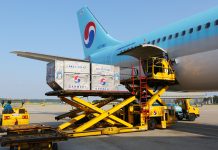 Federal Express (FedEx) released insights from a new survey examining trade lane trends between Asia Pacific (APAC) and Europe that highlights key enablers and barriers to cross-border trade. Conducted in September 2025, the survey polled 850 small- and medium-sized businesses (SMEs) across 13 APAC markets and over 1,200 SMEs across nine European markets, exploring business sentiment, readiness, and challenges for cross‑border expansion among APAC firms expanding into Europe and European firms exploring opportunities in APAC.
Federal Express (FedEx) released insights from a new survey examining trade lane trends between Asia Pacific (APAC) and Europe that highlights key enablers and barriers to cross-border trade. Conducted in September 2025, the survey polled 850 small- and medium-sized businesses (SMEs) across 13 APAC markets and over 1,200 SMEs across nine European markets, exploring business sentiment, readiness, and challenges for cross‑border expansion among APAC firms expanding into Europe and European firms exploring opportunities in APAC.

The survey findings reveal a notable surge in European trade among APAC small and medium businesses, with 76% of respondents reporting increased export volumes over the past year. The United Kingdom (42%), Germany (40%), and France (38%) emerged as the top three markets driving business growth.
Confidence is equally strong among European SMEs, with 87% of businesses shifting their balance of trade toward APAC or maintaining current levels. China (55%), Japan (36%) and South Korea (24%) were seen as among the top growth markets over the next two years. This reciprocal optimism among SMEs reflects broader market dynamics, with the Asia–Europe trade lane recording 30 consecutive months of growth as of August 2025, demonstrating remarkable growth momentum along this vital trade corridor for businesses of all sizes.
The growth in Asia-Europe trade is being driven by several key factors. In APAC, strong consumer demand in Europe, improved price competitiveness for Asian products and services, and strategic expansion opportunities are major contributors, with 68% of respondents attributing growth to these factors. A significant 85% of APAC businesses plan to begin or expand trade with Europe in the next 12–24 months.
Meanwhile, European businesses are drawn to APAC due to strategic prospects, comprehensive logistics solutions, and favourable trade agreements.
While there is strong enthusiasm by APAC and Europe SMEs to expand cross‑border trade, they are also aware of the challenges ahead. Regulatory shifts, complex customs procedures and global market volatility are major concerns impacting 86% of APAC SMEs and 78% of European SMEs’ ability to conduct business.
To overcome these challenges, SMEs are looking for solutions. 30% of APAC and 41% of European businesses want digital tools to improve supply chain visibility, streamline shipping, and reduce delivery times. Additionally, 27% of APAC and 41% of European SMEs seek greater customs expertise to navigate shifting regulations, avoid delays, and manage costs effectively.
According to Salil Chari, senior vice president, Marketing and Customer Experience at FedEx, Asia Pacific, “Amid ongoing shifts in global trade, it’s encouraging to see APAC and European SMEs demonstrating strong confidence in expanding along the Asia–Europe trade corridor. At FedEx, we’re helping our customers unlock their next phase of growth by bringing together the reach of our global network, the power of digital innovation, and our deep trade expertise, helping them trade smarter, more efficiently, and with greater confidence.”
FedEx added five weekly flights connecting Asia to Europe this month and enhanced connectivity between Vietnam to Europe reducing shipment time by one day. FedEx now operates 26 weekly flights connecting APAC shipments to Europe.



















